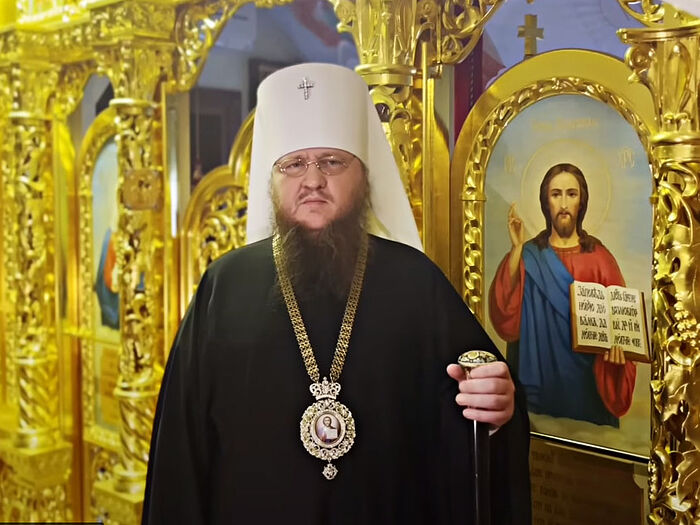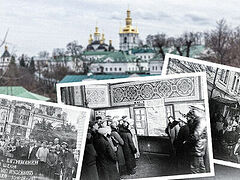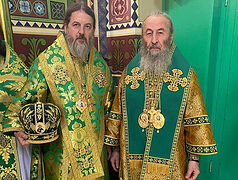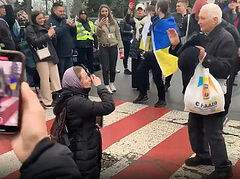Metropolitan Theodosy (Snigiryov) of Cherkassy and Kanev, Ukrainian Orthodox Church, was recently put under house arrest by the Ukrainian Secret Services on the vague charges of “praising Moscow priests who aid the aggressor”. A Ukrainian propagandistic new site states: “It was established that in 2020 he ordered the creation of a new departmental website in the diocese based on the template of the ROC. During its development, Russian software was used, which allows the site to relay destructive content from pro-Kremlin Internet resources. Among them were patriarchia.ru and pravoslavie.ru.” It’s not difficult to imagine what the pro-Kremlin content was: unity of Orthodox Churches and Orthodox peoples, reportage on persecutions against the Ukrainian Orthodox Church, Church history, and explanations of canon law. Anyway, the site doesn’t get into the content.
His Eminence gave a video talk to his flock while under house arrest (April 26, 2023), which we reproduce in English translation below.
 Metropolitan Theodosy (Snigiryov). Photo: YouTube screenshot
Metropolitan Theodosy (Snigiryov). Photo: YouTube screenshot
Christ is Risen!
Dear brothers and sisters! I am addressing you while under house arrest. Bright Week has passed, and these days were very special for me and for you. First of all, I address the flock of the Cherkassy diocese: the clergy, monastics, laity, and all those with whom we I been together over the course of these few years. And today we are nevertheless together, despite the fact that we are separated by distance and the impossibility for me to celebrate the divine services in the cathedral church; but mystically, spiritually, we continue to be together.
To the extent that it is possible under house arrest, I try to celebrate the services daily, and pray for our flock. I try to rule the diocese, and so far there has been no problem with this; circulars and orders are brought to me for signature once a week, and when possible, several times a week. I talk on the phone with the father-deans, with the secretaries, and the vicar bishops of our diocese, who celebrate the services, dispense hierarchical awards to the clergy, and give sermons. The diocese lives, and will continue to live. It deflects the small provocations from the enemies and opponents of our Church that are now taking place everywhere in our country, including the small provocations in our Cherkassy diocese. But a certain thing has changed.
Something has changed in my personal spiritual life. I have had more time for solitary prayer and contemplation. Prayerful contemplation. Thoughts about our Church, about the fate of our Church, our people, about the path we have walked over the past several decades since spiritual life was reborn after the Millennial of the Baptism of Rus’. These are the thoughts that I would like to share with you, and which I will share with you; and I plan to regularly record homilies and my words addressed to you, mainly to the Cherkassy diocese.
I am thinking about the present times, when our Church is undergoing trials, a period of persecution, when terrible things are happening around the Kiev Caves Lavra, when churches are being set afire, when churches are being destroyed, when churches and cathedrals are being seized and given over to people who have nothing to do with them, who did not build them, after which there is no one to pray in them. When our Church finds itself in such a circumstances in society, in conditions of persecution, we—Church hierarchs, priests, and laity—are not only able but are under obligation to raise our voices in defense of the Church. We are obligated based on the Social Concept of the Ukrainian Orthodox Church, which was adopted and which states that if the state should raise persecutions against the Church, then the Church reserves the right not only to resist, but also to initiate various peaceful protests—from demanding the repeal of anti-Church legislature to demands that the voice of the Church be heard on the international level, and that pressure or persecutions against the Church be ceased. Much has changed in the life of our society and in the life of the Ukrainian Orthodox Church over the past year. Decisions, difficult decisions were made that are gradually accepted to a greater or lesser extent amongst the people of the Church—or are not accepted.
In thinking today about the fate of our Church, especially today, my soul is pained for the millions of our compatriots—the laity, clergy, and many bishops of our Church who are experiencing, like a deep and painful wound in the soul, those processes within the Church that were set in motion due to the circumstances of life in society over the past year. Not all are in agreement with those canonical changes happening in our Church. For many, the unity that was preserved through millennia, the unity of Churches, which although was at some periods disrupted but later again restored, is a great treasure—a treasure that must not, cannot be destroyed or torn apart by the fleeting circumstances of life, including political circumstances. We are not talking here about some kind of justification of or support for war. Here we are talking not about war, nor about politics. We are talking about the unity of the Churches, which has endured through a multitude of political regimes, internecine wars, rulers both pious and impious, hierarchs both pious and impious, betrayers, those who led us into the Unia, those who tried to destroy the unity of our Church. Our Church has lived through very much over its thousand years of existence, and the Church like no one else knows ontologically that wars break out and end, rulers come and go, even countries arise and disappear, whole empires are destroyed; but the Church is unshakable. It still stands. And the Church stands not only in the general sense of the Church as the Body of Christ of the Orthodox Church, which is universal, but also in the sense of our Church of the Baptism of St. Vladimir, the Church of Holy Rus’. There have been many internecine wars in our land. The Novgorodians warred with the Kievans, the Kievans warred with the Pksovians, there were the Mongel-Tatar invasions, internecine wars between princes who, as a rule, desired to sit down in Kiev upon the main throne. They warred for succession to the throne in cities of Northern Rus’. But the thought never occurred to the hierarchs of those times to weave the Church into the context of internecine wars, to make the Church into a weapon for fomenting hatred between peoples or various tribes. Our Church always stood for peace, and prayed for peace; and when it was forced into supporting war, in usually kept silence. It is this silence that, as it seems to me, many of the hierarches, priests, and laity of our Church are preserving today.
Because they do not support the narrative of hatred that is so popular now—narratives that are destroying our society from within—they are having to pay with their own freedom, with the impossibility of plainly saying what they think. And this is goes on thus far under conditions of legislature that very carefully and sophisticatedly, with the hands of certain enforcers of these laws, are warring against people who think freely. Only very recently bill No. 9223 was introduced in the Supreme Parliament, which will most likely put an end to all freedom of speech in our country. And after it’s passed, we will no longer be able say what we can still say now. And the fact that the Church will not be able at all to witness the truth, which will not correspond to the Procrustean bed of those ideas and principles that are now being inculcated into our society, is a great tragedy for the Church. Therefore, we need to hurry and say today what we will then simply no longer be able to say.
I wish for all of us to survive this time. It will definitely pass. Whatever is founded upon lies, hatred, and evil inevitably falls apart. Truth triumphs in eternity, and you and I know this. But I believe that truth with triumph here on earth for some time; we, the children of the Orthodox Church, which had its beginning here in the land of Prince Vladimir, will yet rejoice in a blossoming of the Church, in prosperity, blessedness, and peace—peace that we practically did not appreciate, and therefore lost.
I greet you once again with the bright days of Christ’s Resurrection.




